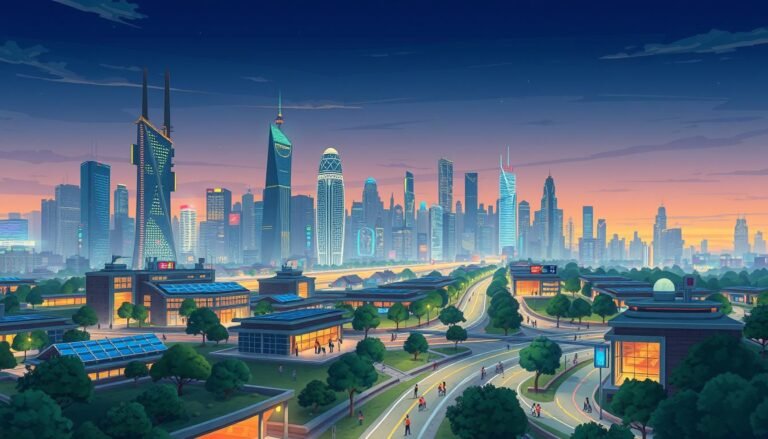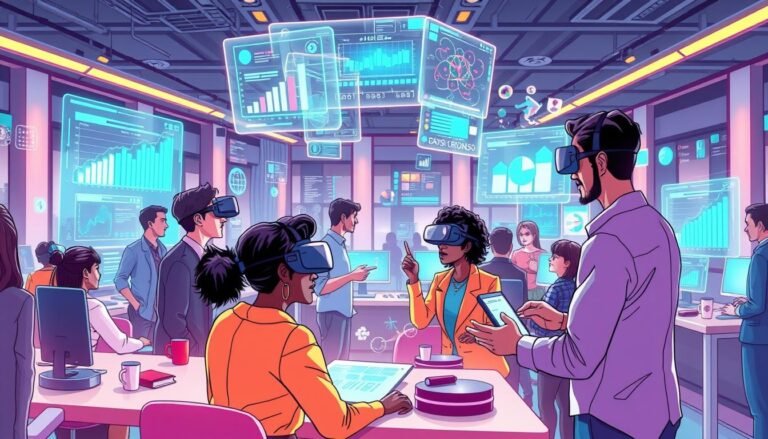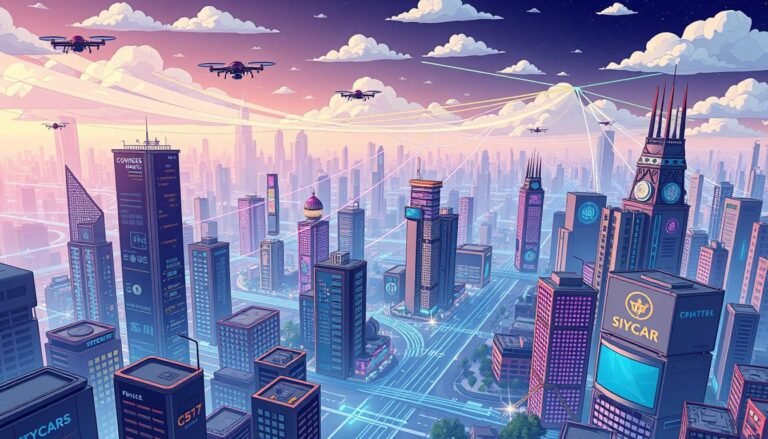Circular Economy: Sustainable Practices for Irish Businesses
Did you know the circular economy only makes up 9% of global practices? Yet, it could help tackle up to 60% of climate change impacts. The Irish government buys about €12 billion worth of goods and services each year. By using circular economy ideas, Ireland could lessen environmental harm and move towards sustainability.
Ireland is now focusing more on sustainable practices to meet climate goals and cut down on waste. By going circular, Irish companies can keep resources in use longer. This reduces the need to extract new resources and lowers carbon emissions.
Using closed-loop systems matches Ireland’s push for environmental responsibility. It also puts Irish businesses ahead in global sustainability efforts. As circular economy ideas spread, Irish companies can innovate and support the environment. Ireland is starting a new era, facing environmental issues with circular solutions.
Key Takeaways
- The circular economy currently covers only 9% of global practices but has the potential to tackle 60% of climate change issues.
- The Irish government’s procurement practices, accounting for €12 billion annually, show substantial potential for fostering sustainability.
- Implementing closed-loop systems helps minimize waste and carbon-intensive practices among Irish enterprises.
- Circular economy principles support Ireland’s environmental responsibility targets and climate objectives.
- Embracing circular economy strategies can drive innovation and sustainable practices in Ireland.
Understanding the Circular Economy
Ireland is working hard to meet global sustainability goals. It’s key to understand the circular economy for this. Moving from old economic ways, where resources get used once and then thrown away, is vital. The circular economy aims for better development by cutting waste, using resources wisely, and supporting green projects.
Linear vs Circular Economy
The old economy follows a ‘take-make-waste’ path, harming the environment. On the other hand, the circular economy uses a ‘take-make-remake’ approach. It aims to make products last longer by reusing and recycling. This change helps reduce waste, supports eco-friendly actions, and lowers carbon emissions.
Only 8.4% of the world’s economy is circular, as shown in the 2021 Circular Gap Record. This shows a big area for growth.
Key Principles of Circular Economy
In Ireland, the circular economy follows key principles for sustainable actions:
- Design Out Waste: Products are made to create less waste and use renewable resources.
- Keep Products and Materials in Use: Products are kept going through maintenance, reuse, and recycling.
- Regenerate Natural Systems: Practices are chosen that help restore or renew energy and materials.
| Country | Circular Material Use Rate |
|---|---|
| Netherlands | 28.5% |
| European Union Average | 12% |
| Ireland | 1.6% |
Ireland needs to do more for green initiatives, as shown by Eurostat in 2019. Its circular material use rate was just 1.6%, far behind the EU average. But, efforts like the Circular Economy Bill and the Plastic Bag Levy are moving things forward.
The Importance of Circular Economy Policies in Ireland
Ireland has made big steps towards a sustainable future with its circular economy policies. Key actions include the Waste Action Plan for a Circular Economy and the Whole of Government Circular Economy Strategy. These plans are crucial for a sustainable future, focusing on reducing waste and improving resource use.
Waste Action Plan for a Circular Economy
The Waste Action Plan for a Circular Economy was launched to improve sustainability in Ireland. It sets goals like cutting waste by 55% by 2030 and recycling 55% of plastic packaging. This plan is key to creating a better waste management system.
The plan also supports Green Tenders, which add environmental goals to public buying. The Circular Economy Innovation Grant Scheme (CEIGS) gives up to €100,000 to projects that help the circular economy.
Whole of Government Circular Economy Strategy
The Whole of Government Circular Economy Strategy guides Ireland towards a circular economy. It was put in place from 2022-2023 and focuses on sustainable buying and cutting greenhouse gas emissions by 51% by 2030. It shows how economic growth and sustainability go hand in hand.
Training and education are key, but only 35% of people have basic knowledge on the circular economy. This shows a big need for more education to help people and businesses join the circular economy.
The strategy works with the EPA and other groups to create rules that protect the environment. This teamwork is vital for a sustainable and strong future for Ireland.
Innovative Circular Economy Practices Among Irish Businesses
Irish businesses are now adopting new ways to make their operations more sustainable. They’re using eco-friendly methods to cut down on waste and use resources better. This shift helps them lessen their impact on the environment.
Reusing and Recycling
Many Irish companies are at the forefront of reusing and recycling materials. This is key to the circular economy. Groups like the Plastics Action Alliance are pushing for better plastic packaging that breaks down easily or can be composted. The government is also helping with programs like the National Waste Action Plan to reduce plastic waste.
- The Circular Economy Strategy aims to surpass the EU average circularity rate by 2030.
- CIRCULÉIRE platform targets a 20% reduction in greenhouse gas emissions and waste production among 30 participating companies.
- The Circular Economy Bill encourages the use of reusable and recyclable items and has strict rules for waste sorting in businesses.
- Social Justice Ireland fights for sustainability by pushing for the polluter to pay and cutting down on single-use items.
Resource Efficiency
Improving how we use resources is crucial for a sustainable circular economy. Making better use of resources could save Europe €600 billion a year and increase GDP by up to 7%. Ireland is working hard to use resources better through different programs, such as:
- The Smart Farming program has cut greenhouse gas emissions by 10% and saved €6,336 per farm.
- The Green Transition Fund helps companies go green by offering planning, training, investment, research, and innovation support.
- Enterprise Ireland provides funding and support for sustainable practices and processes through GreenStart and GreenPlus.
By focusing on using resources better, Irish businesses are not only helping the planet but also saving money and becoming more competitive. The path to a sustainable future is clear, and Irish companies are leading the way.
Circular Economy: Sustainable Practices for Irish Businesses
Irish businesses are key to a circular economy, which helps the environment and boosts the economy. This section looks at how waste reduction and caring for the environment are becoming part of the hospitality and manufacturing sectors.
Reducing Waste in the Hospitality Sector
In Ireland, hotels and restaurants are now focusing on cutting waste. Food waste harms the environment by damaging land and threatening animals. By using circular economy ideas, these places can save money and be more sustainable.
Zero-waste dining and sharing food can cut waste and bring people together. These actions help Ireland use resources better and could save up to €2.3 billion a year.
Environmental Responsibility in Manufacturing
Manufacturing is vital for the environment. Companies that follow circular economy ideas can save on materials and cut waste costs. This helps Ireland meet goals to cut carbon emissions by 51% by 2030 and be climate-neutral by 2050.
Buying sustainable products and building circular supply chains are key. Groups like CIRCULÉIRE work on reducing emissions and waste. The European Union’s Second Circular Economy Action Plan, started in March 2020, aims to speed up this change.
Here’s a look at some support for sustainability in Ireland’s manufacturing:
| Scheme | Description | Grant Amount |
|---|---|---|
| GreenPlus Grant | Development of environmental management capabilities | Up to €50,000 |
| Enterprise Emissions Reduction Investment Fund | Support for energy monitoring and tracking systems | Up to €50,000 |
| EXEED Grant Scheme | Energy-efficient design projects | Up to €3,000,000 per project |
| Accelerated Capital Allowance Scheme | Deduction of costs for energy-efficient equipment | Not specified |
Using a circular economy in the hospitality and manufacturing sectors helps reduce waste and protect the environment. It also brings economic benefits to Irish businesses.
Government and Enterprise Partnerships
The Irish government and businesses are working together to grow the circular economy. They’re doing this through programs like the Circular Economy Innovation Grant Scheme. These efforts aim to make sustainability a key part of our future.
Circular Economy Innovation Grant Scheme
Minister Ossian Smyth TD launched the Circular Economy Programme. It supports the move to a circular economy. The program offers grants up to €100,000 for projects that make a big difference.
Vyta, a top company in IT Asset Disposition and Lifecycle Management, is a great example. In 2023, they handled 450,000 devices. This helped reduce CO2 emissions and reuse technology.
Eco-friendly Initiatives and Community Engagement
Eco-friendly projects are key to a sustainable future. Programs like Green Tenders encourage the use of green technologies in public procurement. This effort helps the whole sector become more eco-friendly.
Vyta made a big impact in 2022. They cut down nearly 40,000 tonnes of CO2 emissions. They also reused 2,167 computers, helping over 30,000 disadvantaged students.
| Organization | Achievement | Impact |
|---|---|---|
| Vyta | 450,000 devices recycled in 2023 | 40,000 tonnes of CO2 emissions prevented |
| Irish Government | Circular Economy Innovation Grant Scheme | €100,000 grants for impactful projects |
| Community Programs | Green Tenders | Eco-friendly procurement across sectors |
Challenges and Opportunities in Transitioning to a Circular Economy
Moving to a circular economy brings both challenges and chances for Ireland. It will need big efforts in building new infrastructure and changing how businesses and people act.
Need for Infrastructure Development
Building strong infrastructure is key. We need better waste collection systems, processing facilities, and recycling centers. Ireland has cut its waste per person from 737 kg in 2004 to 555 kg in 2020. But, we still need more to keep improving.
The construction sector, which creates almost half of Ireland’s waste, has big challenges and chances to go circular. Adopting circular practices in construction could greatly reduce waste and save resources.
Behavioral Change and Education
Changing how people act and educating them is vital for a circular economy. Governments must lead with education and awareness campaigns. Ireland puts 1.896 million EUR each year into the National Waste Prevention Programme to cut household waste and change behaviors.
Reducing food waste is another focus, aiming to cut waste during production and use food recovery programs. The goal is to cut food waste by 50% by 2030. This shows how education and changing behaviors are key to reaching these goals.
Working together and investing in these areas will help meet our big climate goals. It will also give businesses and consumers chances to join a sustainable future.
Conclusion
Irish businesses are moving towards sustainable practices, embracing the Circular Economy. This approach aims to cut down on waste and make better use of resources. It’s a big step towards long-term benefits for the environment and economy.
Key to this change are the principles of the circular economy. These include designing products to last longer, reusing and fixing items, recycling materials, and reducing waste. These ideas are crucial for making businesses more resilient and eco-friendly.
Government support and partnerships have been vital in driving this change. Programs like the Energy Efficiency Grant and MODOS offer crucial help to companies. They encourage the use of circular economy ideas.
These efforts are already showing results. For example, boosting circularity in Ireland could save €2.3 billion a year. It also could create more jobs and help reduce social inequalities by offering diverse work opportunities.
For the future, everyone’s ongoing support is crucial. The government plans to make the Circular Economy Strategy a law. This shows a strong commitment to the cause. More investment, training, and policies will help too.
With events like Dublin hosting the European Circular Economy Hotspot in 2023, Ireland is showing its leadership in the circular economy. By keeping up these efforts, Irish businesses can move closer to a sustainable, resilient, and prosperous future.
Source Links
- Circular Economy developments from the Irish Government
- Improve sustainability | Business Support
- Circularity – ..rteredaccountants.ie
- What is the circular economy and what does it mean for Ireland?
- Insights
- The Circular Economy
- Progress on the circular economy | Social Justice Ireland
- Supports for businesses going green
- Government launches Ireland’s first Whole of Government Circular Economy Strategy –
- Vyta – Northern Ireland Business Receive King’s Award for Enterprise for Sustainable Development – The King’s Awards for Enterprise
- From waste to wealth
- Circular Economy & Sustainability – Local Enterprise Office








